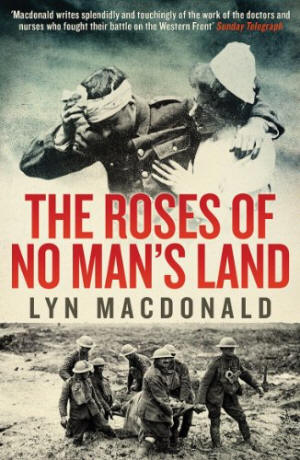Catholic Medical Quarterly Volume 69(1) February 2019
Correspondence
First World War Medics
Dr Stephen Brennan FRCP
 I
came across a book review in the BMJ 1980(1), as you do when retired; it
set off some thoughts about how things have changed. It was written by
Ronald Gibson, a colleague of my father, Edward Bernard Brennan, both in
the RAMC in the WW2 and who both became radiologists after that war. The
book was “The Roses of No Man’s Land” by Lyn MacDonald(2) about medical
services in WW1. It spoke of the initial enthusiasm and hopes, gradually
moving to anxiety and weariness at the endless mutilation and destruction.
I have yet to obtain a copy of this extraordinary book, but it is
thoroughly researched and full of letters from doctors, sisters, and
members of the Voluntary Aid Detachment at the front-line. They didn’t
have time to be novices, quickly getting used to improvisation, inadequate
equipment and accommodation, as they dealt with thousands of casualties,
many of whom who had only left the safety of home days before. Wards were
soon in chaos with “mud and cold, hunger and fatigue”. Casualties of gas
attacks, gunshot wounds, shrapnel, gas gangrene, blindness, suffocation,
pneumonia, enteric fever and shell shock. Sometimes two surgeons would be
working six operating tables “with only a Padre to give the anaesthetics”.
“Filthy dressings had to be torn off screaming soldiers by gentle girls
who had never seen suffering before, let alone chronic agony and death”.
I
came across a book review in the BMJ 1980(1), as you do when retired; it
set off some thoughts about how things have changed. It was written by
Ronald Gibson, a colleague of my father, Edward Bernard Brennan, both in
the RAMC in the WW2 and who both became radiologists after that war. The
book was “The Roses of No Man’s Land” by Lyn MacDonald(2) about medical
services in WW1. It spoke of the initial enthusiasm and hopes, gradually
moving to anxiety and weariness at the endless mutilation and destruction.
I have yet to obtain a copy of this extraordinary book, but it is
thoroughly researched and full of letters from doctors, sisters, and
members of the Voluntary Aid Detachment at the front-line. They didn’t
have time to be novices, quickly getting used to improvisation, inadequate
equipment and accommodation, as they dealt with thousands of casualties,
many of whom who had only left the safety of home days before. Wards were
soon in chaos with “mud and cold, hunger and fatigue”. Casualties of gas
attacks, gunshot wounds, shrapnel, gas gangrene, blindness, suffocation,
pneumonia, enteric fever and shell shock. Sometimes two surgeons would be
working six operating tables “with only a Padre to give the anaesthetics”.
“Filthy dressings had to be torn off screaming soldiers by gentle girls
who had never seen suffering before, let alone chronic agony and death”.
Without antibiotics, the complications of wounds were unimaginable; lives depended on antiseptics like Eusol, Dakin’s Solution and more surgery. Later in the war, blood transfusion became useful in cases of chronic infection as well as blood loss. Loading casualties on to lorries and trains to move them back from the front after the battles to varied accommodation, maybe open-air muddy shelters, local homes, hotels, or even stately homes, must have been the final straw; everyone cold, wet, hungry, dirty and lice-ridden, but trying not to let it all rub off on the patients. “If you couldn’t laugh you were finished”.
Could we health workers of today cope like that now, “spoilt” as we are by our splendid NHS? I think the computer says “no”! However, we of faith have other resources, and could, as always, rely on God’s help to keep us going from day to day, provided we asked for it. We must pray that our NHS can keep going.
References
- BMJ 1980. Vol. 281. p.1464.
- “The Roses of No Man’s Land” by Lyn Macdonald. 1980. Michael Joseph.
